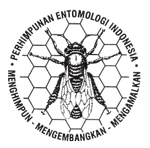Status dan perkembangan resistensi Aedes aegypti (Linnaeus) (Diptera: Culicidae) strain Bandung, Bogor, Makassar, Palu, dan VCRU terhadap insektisida permetrin dengan seleksi lima generasi
DOI:
https://doi.org/10.5994/jei.13.1.1Keywords:
Aedes aegypti, insecticide selection, permethrin, resistanceAbstract
Aedes aegypti (Linnaeus) (Diptera: Culicidae) is the main vector of dengue fever. In Indonesia, insecticides, especially pyrethroids, such as permethrin, have been effectively used to control Ae. aegypti. Notwithstanding that permethrin has been used since 1980s, information regarding the status and development of resistance of Ae. aegypti to permethrin is still limited and need further update. This study was conducted using the WHO standard test method. The aims was to determine the resistance status, and changes in resistance level of four field strains (Palu, Makassar, Bandung, Bogor) and susceptible strain (VCRU) of Ae. aegypti after the selection with permethrin for five generations. The results showed that resistance status of all field strains to permethrin were considered as high. The value of RR50 ranged between 10.5 to 25.7 fold. Bandung strain had the highest value of RR50 (22.5 fold), while Makassar strain had the lowest value of RR50 (10.5 fold). The fifth generation (F5) of five selected Ae. aegypti strains had the level of resistance 5 to 18 times higher than their parental. Knowledge of resistance status in a given area accompanied with the understanding about the development of resistance can be used to design a better vector management.Downloads
Downloads
Published
How to Cite
Issue
Section
License
Authors who publish with this journal agree to the following terms:
- Authors retain copyright and grant the journal right of first publication with the work simultaneously licensed under a Creative Commons Attribution 4.0 International License that allows others to share the work with an acknowledgement of the work's authorship and initial publication in this journal.
- Authors are able to enter into separate, additional contractual arrangements for the non-exclusive distribution of the journal's published version of the work (e.g., post it to an institutional repository or publish it in a book), with an acknowledgement of its initial publication in this journal.
- Authors are permitted and encouraged to post their work online (e.g., in institutional repositories or on their website) prior to and during the submission process, as it can lead to productive exchanges, as well as earlier and greater citation of published work (See The Effect of Open Access).








